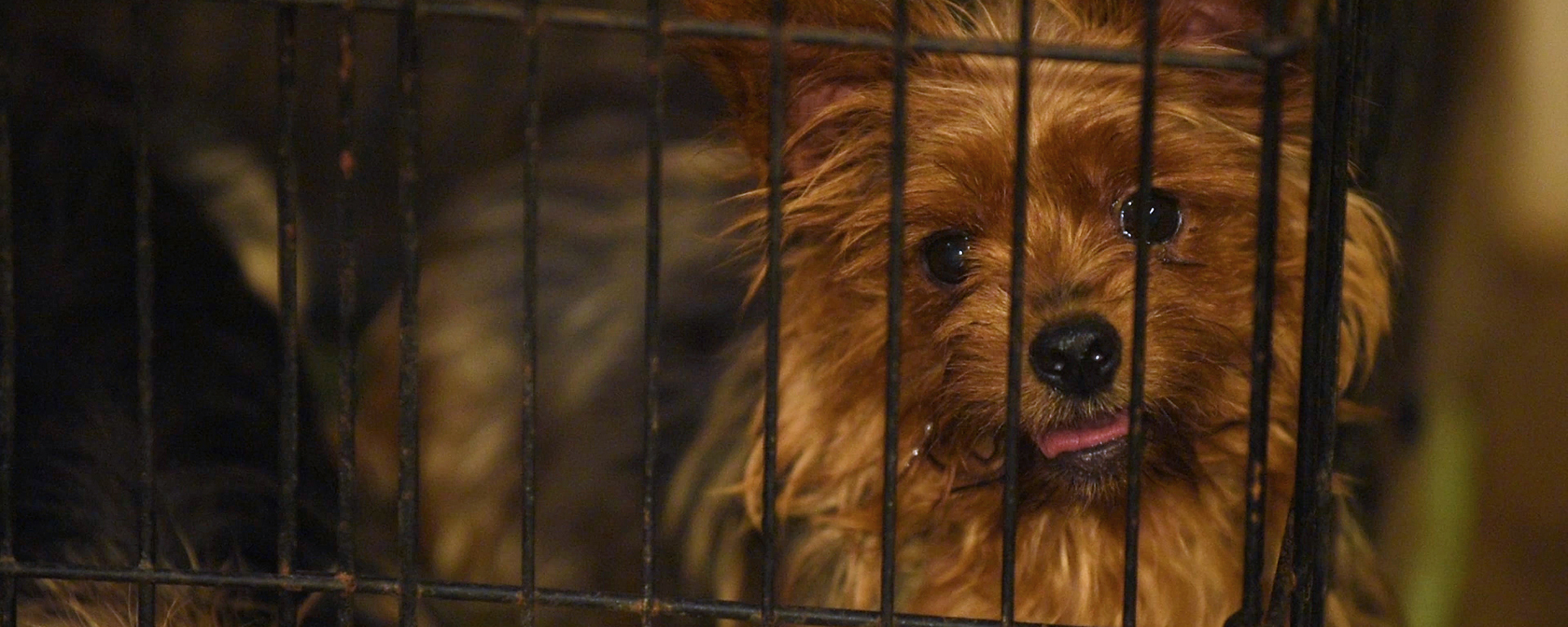By Sara Amundson and Kitty Block
What dog lovers don’t know about where their beloved puppies come from can hurt them. When puppies are born to emaciated, sick or injured dogs in cramped and dirty wire cages, the physical and mental toll can extend throughout their lives, impacting their behavior and wellbeing while causing heartache and heavy expenses for those who love them. And of course, for the mother dogs who are left to live and be bred in such squalid, neglectful conditions, the suffering doesn’t stop.
That’s why every year we identify 100 puppy mills in our Horrible Hundred report. Our undercover photos and even the inspection reports of some of these operations reveal that federal and state inspection systems are failing these dogs. This year’s report underscores that the need for reform could not be more urgent.
So many puppy mill puppies are born in filthy cages, crammed among row after row of similarly caged dogs, with no room to run or play. Mother dogs often spend years living on a wire floor, forced to churn out puppies until their bodies are exhausted. Many breeders kill the mother dogs instead of continuing to feed animals who are no longer profitable.
Dozens of pet stores across the country purchased puppies from puppy mills listed in this year’s Horrible Hundred report. These stores are making things worse for animals and consumers by serving as a conduit for all the suffering and cruelty of the puppy mill industry, selling animals at high volume and high prices, papering over their social, health and genetic problems—all rooted in the puppy mill model. Many other puppy mills sell their pups online through slick, professional-looking websites, posing as responsible breeders.
While there are too many stories of what goes on at these puppy mills to tell, a few examples from this year's report underscore the industry’s callous indifference to animals and their most basic needs:
- An American Kennel Club “Champion Show Dog” breeder in Iowa (Mystical Cockers), who was previously sentenced to jail time after 88 animals were seized from her property and five dogs were found dead, was given a new license by her state and continues to sell online via PuppyFind.com, a website the HSUS has repeatedly linked to puppy mills.
- A breeder in Missouri (Deanna Brundage) had her U.S. Department of Agriculture license revoked in 2008 after at least seven unwanted dogs were found shot dead, puppies were found dead and dogs were found emaciated or sick. She still received a new state license in 2020.
- A dog dealer in Iowa (Steve Kruse, Stonehenge Kennel) has been found with more than 50 sick or injured dogs on his property since 2015. He is still licensed by his state and by the USDA, which means he can continue to sell to pet stores or online across the U.S.
- A breeder in Ohio (Joseph A. Miller, Horseshoe Kennel) admitted that he performed a do-it-yourself dental procedure on one of his dogs instead of taking her to a veterinarian, and that she died while struggling to break free. Miller seemingly was not significantly penalized for this incident and is still licensed both by the state and the USDA.
Many breeders cited for multiple violations by state inspectors were not cited by the USDA—highlighting a steep drop in enforcement from the agency since 2017. But pet shops still use USDA inspection reports to prove a breeder’s legitimacy. Our Petland investigations show that people seeking to buy a pet shop puppy are often presented with “clean” USDA inspection reports on the puppy’s breeder. The salespeople claim these reports are proof that Petland buys from quality breeders. Our undercover investigations show that breeders can treat animals horribly yet have no citations from the USDA. At least 21 Petland stores sourced their dogs from a Horrible Hundred breeder or dealer in this year’s report.
Over the last four years, the USDA hasn’t been doing its job of enforcing the Animal Welfare Act to give meaningful protection to dogs at these facilities—but we have new USDA leadership in place, and officials who have promised that they will take animal care and the agency’s regulatory responsibilities seriously. Now is their chance. That’s why we are calling upon the government to do more to enforce the law.
And you can help:
- Download our free resource kit for activists.
- Write to your representatives in Congress and ask them to cosponsor the Puppy Protection Act. This act would require significant upgrades to the Animal Welfare Act, requiring breeders to obtain prompt professional veterinary care for injured or sick dogs and prohibiting keeping dogs in stacked cages with wire floors. It would also require puppy mills to give dogs more room to run and play, and to try to find homes for retired breeding dogs instead of destroying them.
- If you are thinking about adding a dog to your family, consider adoption first.
- Don’t buy a puppy from a pet store or Internet site, or from any breeder you have not met in person and carefully screened.
- Text “PUPPY” to 30644 for a list of local pet stores that do not sell puppies, or see our website for a state-by-state list.
- Share our Horrible Hundred report with your friends and family so they can learn why the puppy mill industry does not deserve their dollars.
Kitty Block is President and CEO of the Humane Society of the United States.




